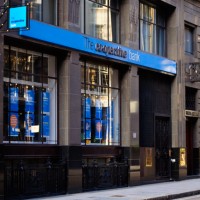
As details of a £1.5bn rescue package were announced, the group disclosed the City regulator, the Financial Conduct Authority, was asking questions about information it provided about its financial strength in its 2012 annual report. The bank had concluded it did not need to reissue the accounts, according to the Guardian.
About 50 of the 324 Co-op bank branches are to close and a significant number of jobs from the 10,000-strong workforce are under threat as the new management team attempts to reverse steep losses.
It could take five years to make the bank profitable again after losses caused by bad lending and the merger with the Britannia building society in 2009.
The troubles at the bank are forcing the wider Co-operative Group, which owns supermarkets, pharmacies and funeral homes, to pump £462m into the bank – equivalent to around £60 for each of the group’s 7.9m owner-members.
While this is less than the £1bn the group originally expected to stump up, it means the UK’s largest mutual will own just 30% of the bank; the rest will be owned by its bondholders.
Those include a group of hedge funds, led by the US-based Silver Point and Aurelius, that has forced the rewriting of a radical proposal first outlined in June, when the £1.5bn shortfall was identified.
Despite concerns that the millions of pounds being used to prop up the bank would starve the Co-op of cash to invest in its other businesses, the finance director, Richard Pennycook – part of a new management team installed in the last six months – said the alternative would have been worse.
“We are all extremely sorry about what has happened,” said Pennycook. “But there is a difference between today and June. In June, if we hadn’t taken this action the bank was going to go bust … the impact on the wider group would have been disastrous.”
Bondholders including 30,000 retail investors, largely pensioners, still need to back the deal, without which the bank fears it would fall under control of the Bank of England, or could be nationalised.
In an attempt to demonstrate commitment to the ethical stance the bank has been known for since 1992, the new bank will poll its customers in the spring about the businesses it should turn away on ethical grounds. Since 1992 it has turned away £1.2bn of business, including backing for arms shipments, coalmining and cleaning products tested on animals.
But Andre Spicer, a professor at Cass Business School, warned: “With hedge funds at the wheel, the bank will become more ruthlessly commercial. Cutting 1,000 jobs at the same time as you launch an ethics policy is quite a contradiction.”
The bank will be able to use the Co-operative name only if it keeps an ethical stance that will be overseen by an independent director who will chair an ethics and values committee. The bank said “customer power” would keep it ethical.
The Co-operative Group on Monday warned its brand could be damaged by the bank continuing to use the Co-op name. The City regulator the Financial Conduct Authority and the business secretary, Vince Cable, can force the bank to change its name if the description is misleading.
The bank’s constitution will be written from 15 November to force it to take account of the “highest standards of ethical principles” and being a “good corporate citizen … contributing to building a stronger and sustainable society”.
It will not be able to pay dividends to shareholders unless it also considers its commitment to society and the environment. The group of hedge funds, advised by Caroline Silver of the Wall Street investment bank Moelis, and known as LT2, stressed that it was determined to maintain the ethical stance, which Silver described as a “unique mission”.
The hedge funds will put in an extra £125m of capital in addition to their bonds. The secretive group admitted only on Monday that it included Aurelius – known for a long-running battle to force Argentina to pay out £800m – and Silver Point, linked to troubled financial firms such as Lehman Brothers. Others, including Beach Point Capital Management, Caspian Capital, Canyon Capital Advisors and Monarch Alternative Capital, then stepped forward.















